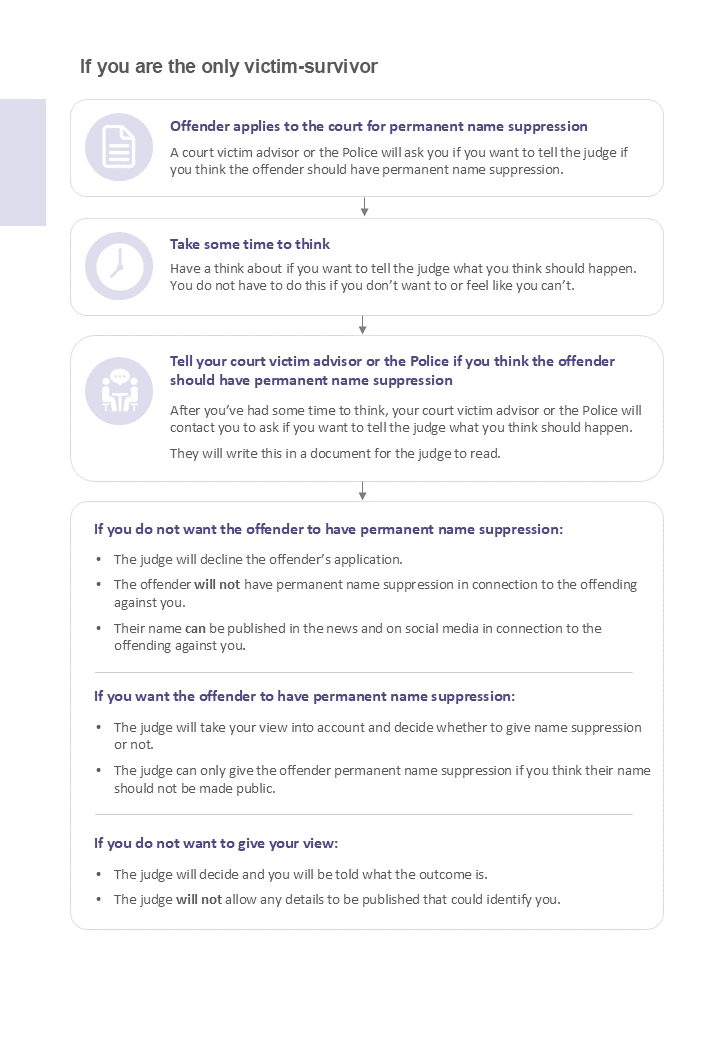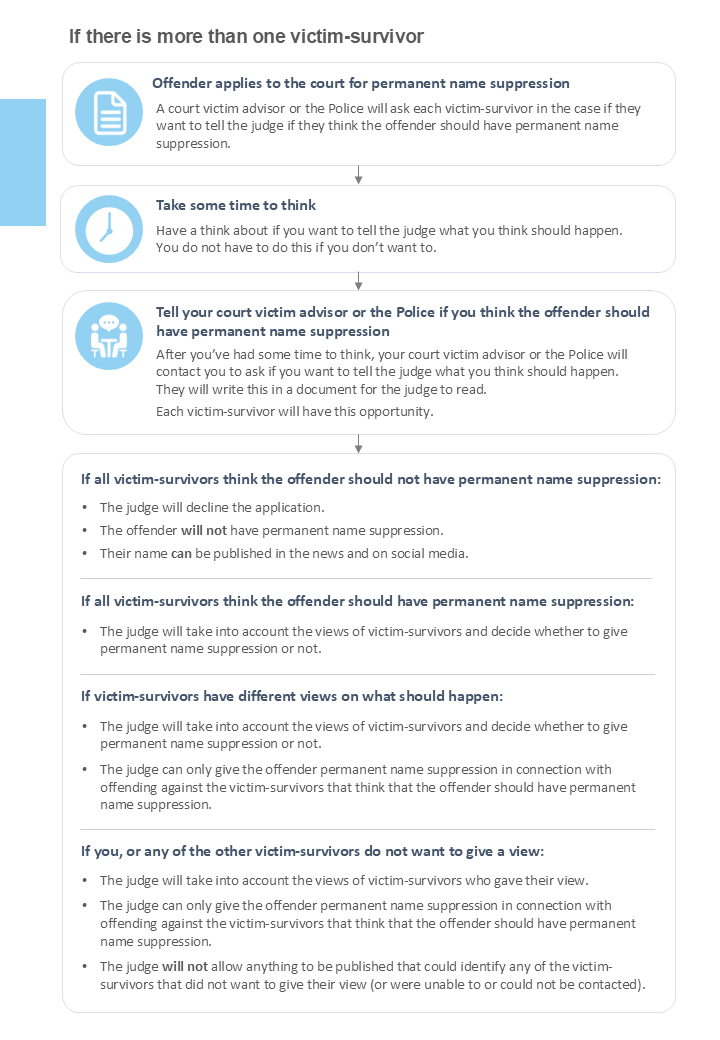What is name suppression?
Name suppression means that a person’s name and any identifying details cannot be published in connection to the case. It means that a person’s name cannot be written or talked about in the news, on social media, or anywhere else.
Automatic name suppression for victim-survivors of sexual offences
Automatic name suppression is given to victim-survivors of sexual offences to protect their privacy and wellbeing. It ensures that victim-survivors can participate in the justice process without fear of unwanted exposure or media attention. You do not need to apply for automatic name suppression, the court will give it to you automatically.
If you are unsure if you have automatic name suppression you can ask the Police or a court victim advisor
E fesoasoani i tagata na aafia ia iloa faagasologa o le faamasinoga
View the full glossary .
Automatic name suppression is permanent and can only be lifted if you decide to apply to the court to lift your name suppression and the court agrees.
How can I lift my automatic name suppression?
You may ask the court to lift your automatic name suppression. If you want more information on how to do this, talk to the Police or a court victim advisor.
Name suppression for the offender in sexual offences
The law was changed in 2025, so this information applies to cases where the charges were filed in court on or after 30 October 2025.
Interim name suppression is temporary name suppression for a defendant and can be given for many reasons, for example if publishing the defendant’s name could cause an unfair trial, or risk someone’s safety.
Permanent name suppression means a person’s name and any identifying details cannot ever be published in connection to the case. If an offender is convicted (pled or found guilty) of a sexual offence, their lawyer may ask the court for their name to be permanently suppressed.
You will have the opportunity to tell the judge if you think the offender should have permanent name suppression if all of the following apply:
- the offender has been convicted of a sexual offence
- you are a victim-survivor of the offence
- an application has been made for the offender’s permanent name suppression
- the offender is an adult.
What happens if I am the only victim-survivor in the case?
The judge can only give the offender permanent name suppression in connection with the offending against you if you think that their name should not be made public.
If you do not think the offender should have permanent name suppression, the judge will not give it to them.
What happens if there are other victim-survivors in the case?
If the offender makes an application for permanent name suppression, all victim-survivors will be asked if they would like to give their views.
Sometimes all victim-survivors will have the same view on name suppression, sometimes they will have different views.
If all victim-survivors in a case think that the offender should not have permanent name suppression, the judge will not give it.
If the victim-survivors have different views, the judge can give permanent name suppression for the offences involving the victim-survivor who supports it and deny name suppression for the offences involving the victim-survivor who opposes it.
A judge may decide on allowing the offender to have name suppression if the judge believes that revealing the offender’s identity is likely to harm one of the other victim-survivors in the case, and this victim-survivor has not, or cannot oppose name suppression.
How does this process work?
A court victim advisor
E fesoasoani i tagata na aafia ia iloa faagasologa o le faamasinoga
View the full glossary or the Police will ask you if you want to tell the court what you think about the offender having permanent name suppression.
For more information about how this process works, have a look at the diagrams on the right-hand side of this page.
What happens if I don’t want to do this?
You don’t have to. If you don’t want to tell the judge what you want, or feel like you’re unable to do this, that is completely fine.
The judge will make the decision and you will be told what they have decided.
The judge will not allow details to be published if they could identify you.
Does this apply to cases in the past?
If a case is currently with the court, but the charges were filed before 30 October 2025, victim-survivors can tell the court whether they think the offender should get permanent name suppression and the judge will take the views into account.
The law was changed in 2025, so for cases where the charges were filed with the court on or after 30 October 2025, victim-survivors' views are handled differently. For these cases, if the victim-survivor does not think the offender should have permanent name suppression, the judge will not give it to them.
If the case is closed or if the offender already has permanent name suppression, you will not have the opportunity to re-visit name suppression.
Who can I contact if I have questions?
A court victim advisor can answer any questions you have about name suppression.
To talk to a court victim advisor, you can use the Victims Information freephone: 0800 650 654 (9am – 5pm, Monday – Friday).
Process if you are the only victim-survivor
 Download Process if you are the only victim-survivor PDF (117 KB).
Download Process if you are the only victim-survivor PDF (117 KB).
Process if there is more than one victim-survivor
 Download Process if there is more than one victim-survivor PDF (119 KB).
Download Process if there is more than one victim-survivor PDF (119 KB).